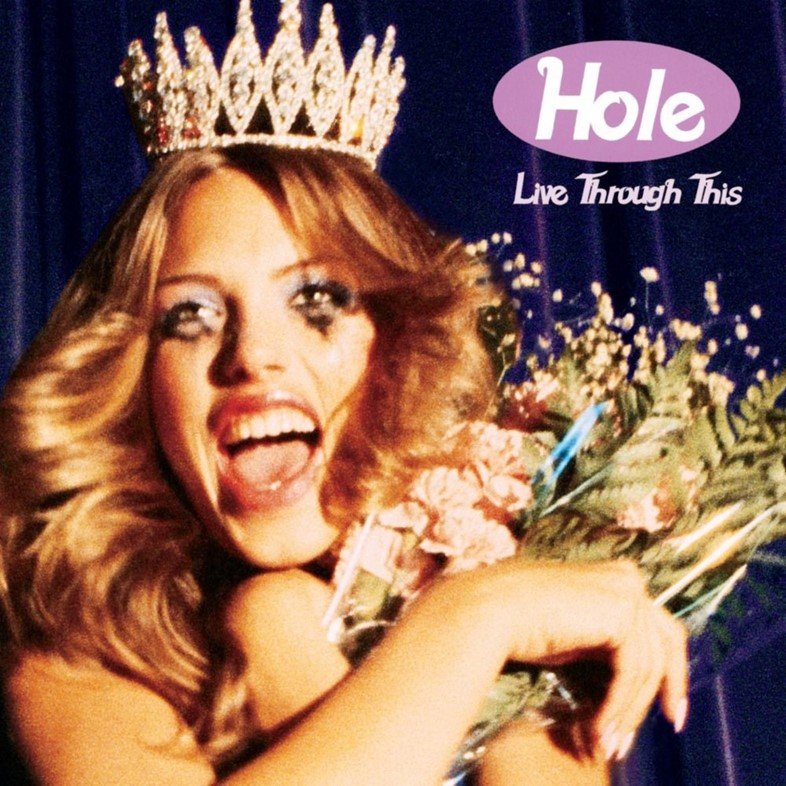The Feminine Musique: Hole's 'Live Through This' and Scorned Womanhood
Nearly thirty years after its release, Live Through This continues to command respect through its unflinching portrayal of scorned womanhood by frontwoman Courtney Love.
Written by Victoria Canales
Photo courtesy of Rolling Stone
Courtney Love’s reputation precedes her. From marrying grunge legend Kurt Cobain to appearing in many scandals over the years, it’s easy to see Love as more of a landmark than an actual person. The grunge singer’s personality shines through in Hole’s 1994 album Live Through This. As the lead singer of the rock band, Love uses her voice to demonstrate her frustration towards topics ranging from violence against women, her fight for custody of her daughter, and her relationship with Kurt Cobain. Live Through This humanizes Love and leaves the listener in a cathartic state at the album’s finish. All of the unfairness, complex emotions, and paranoia that comes with being a woman gets put into the open to be screamed and snarled.
On the track “Miss World,” Love unveils her insecurities as she describes what a woman is expected to be and notices her own shortcomings. Mirroring the album cover, “Miss World” presents the singer as an ironic beauty queen, asking for “kill me pills'' — a reference to both poet Anne Sexton and Love’s own battle with drug use — and admitting to the listener that she “can’t look you in the eye.” Starting off with a soft jangle of guitars, “Miss World” builds up to a fierce mantra — “I made my bed, I’ll lie in it / I made my bed, I’ll die in it / I made my bed, I’ll cry in it” — lamenting the consequences of being in the public eye.
“Asking For It” focuses on the issue of sexual assault by ridiculing the notion that a woman could non-consenusually ask to be abused. Starting off with a faux-sexy voice to mimic the vixen attitude that women are thought to have, Love follows her beloved formula of building from sickly sweet to pure power as she ends the song screaming:
“Was she asking for it?
Was she asking nice?
If she was asking for it,
Did she ask you twice?”
Love wrote “Asking For It” after a stage-diving incident that left her completely naked after the crowd ripped off her clothes. She felt humiliated, and the incident reminded her that even though she managed to be successful in a male-dominated industry, she is still not treated with the same respect.
Photo courtesy of DCG Records
Perhaps the most famous song on the album, “Doll Parts,” is part confessional poetry, part battle cry, and all frustration. Dedicating this song to Kurt Cobain, Love wrote the song in about 20 minutes while in the bathroom at a party. The lyrics and chords are deceptively simple but intentional, yet they deliver a punch. “Doll Parts” starts off with softer guitar chords and lyrics that speak to the vulnerability and objectification that Love was projecting: “I am doll eyes, doll mouth, doll legs.” As the chorus hits, the listener is introduced to the most iconic line of the song: “Someday, you will ache like I ache.” At the end of the song, Love breaks the monotony of this line with a harsh switch from singing to screaming that sounds draining but feels exhilarating. “Doll Parts” is the standout single from the album, and its raw vulgarity allows it to stand the test of time as Hole’s defining song.
Sadly, many listeners have dismissed Live Through This as having been ghost-written by Kurt Cobain. When addressing this issue, Love has expressed that she is offended by this sentiment, and that she wrote the album as a form of competition with Kurt. She believed that Nirvana’s 1991 seminal album Nevermind was a masterpiece, and she hoped to compose something that also equally combined catchy pop and gnarly rock to stay true to her punk-rock roots while still creating something commercially successful. From a purely lyrical standpoint, Live Through This is too vulnerable, too defiant, too feminine to have been written by a man, but it’s still telling that the only way Love’s art is accepted as genius is when it’s thought to be written by her husband. The album then becomes a self-fulfilling prophecy; Love must fight the same misogyny she calls out. It certainly didn’t help either that Cobain, who had been struggling with mental health and substance abuse issues for years, was found dead in his home only a week before the album’s release. Love and Live Through This remained in Cobain’s shadow, even though the album quickly became commercially and critically acclaimed.
Courtney Love is far from a saint or savior of women everywhere, though. She has made many misogynistic, racist, and downright problematic comments and public statements throughout the years, and every Hole fan can attest to the internal struggle of enjoying the music of such a deeply controversial woman. However, she did what countless other women did not envision as possible: she rose to the top in a man’s world, and she made it look easy. Live Through This offers valuable insight on how persevering through the misogyny around her was actually far from easy, and it stands as a soundtrack to the most difficult aspects of any woman’s life.


